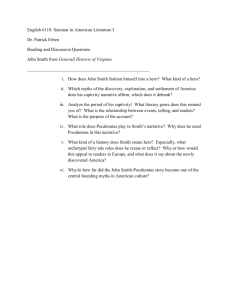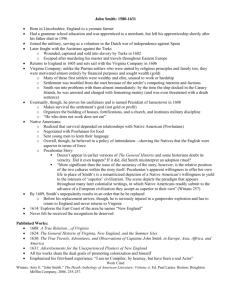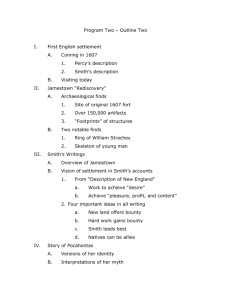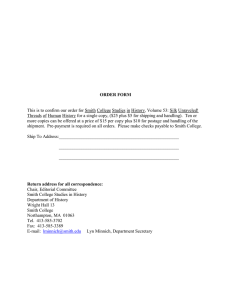Brief outline of the history
advertisement
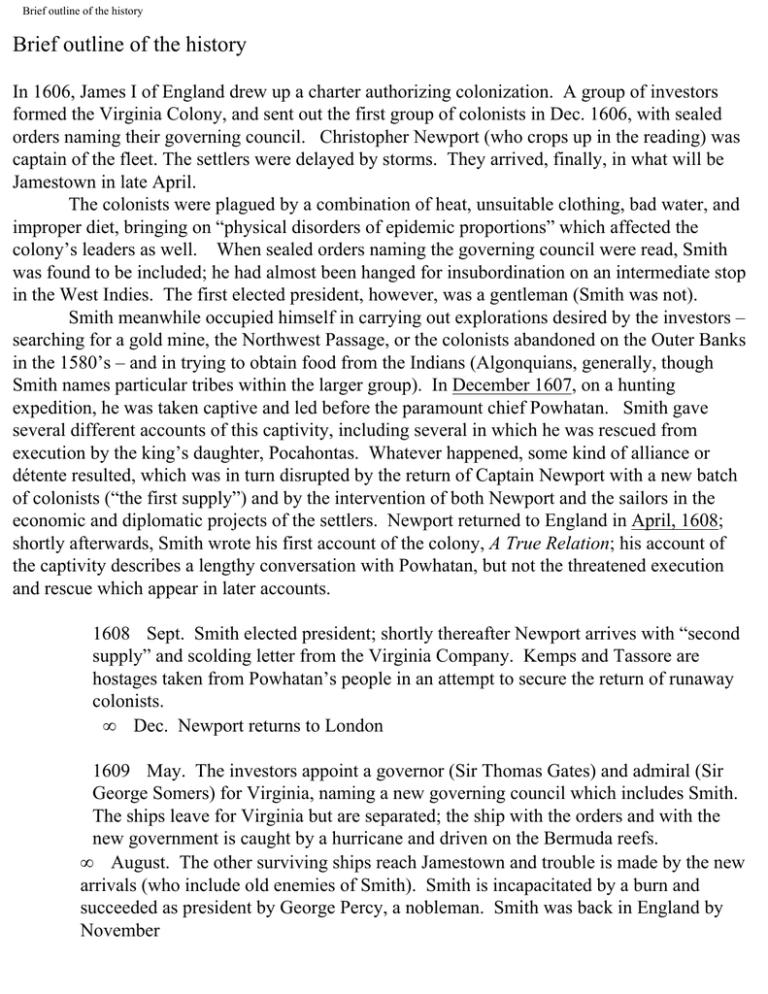
Brief outline of the history Brief outline of the history In 1606, James I of England drew up a charter authorizing colonization. A group of investors formed the Virginia Colony, and sent out the first group of colonists in Dec. 1606, with sealed orders naming their governing council. Christopher Newport (who crops up in the reading) was captain of the fleet. The settlers were delayed by storms. They arrived, finally, in what will be Jamestown in late April. The colonists were plagued by a combination of heat, unsuitable clothing, bad water, and improper diet, bringing on “physical disorders of epidemic proportions” which affected the colony’s leaders as well. When sealed orders naming the governing council were read, Smith was found to be included; he had almost been hanged for insubordination on an intermediate stop in the West Indies. The first elected president, however, was a gentleman (Smith was not). Smith meanwhile occupied himself in carrying out explorations desired by the investors – searching for a gold mine, the Northwest Passage, or the colonists abandoned on the Outer Banks in the 1580’s – and in trying to obtain food from the Indians (Algonquians, generally, though Smith names particular tribes within the larger group). In December 1607, on a hunting expedition, he was taken captive and led before the paramount chief Powhatan. Smith gave several different accounts of this captivity, including several in which he was rescued from execution by the king’s daughter, Pocahontas. Whatever happened, some kind of alliance or détente resulted, which was in turn disrupted by the return of Captain Newport with a new batch of colonists (“the first supply”) and by the intervention of both Newport and the sailors in the economic and diplomatic projects of the settlers. Newport returned to England in April, 1608; shortly afterwards, Smith wrote his first account of the colony, A True Relation; his account of the captivity describes a lengthy conversation with Powhatan, but not the threatened execution and rescue which appear in later accounts. 1608 Sept. Smith elected president; shortly thereafter Newport arrives with “second supply” and scolding letter from the Virginia Company. Kemps and Tassore are hostages taken from Powhatan’s people in an attempt to secure the return of runaway colonists. • Dec. Newport returns to London 1609 May. The investors appoint a governor (Sir Thomas Gates) and admiral (Sir George Somers) for Virginia, naming a new governing council which includes Smith. The ships leave for Virginia but are separated; the ship with the orders and with the new government is caught by a hurricane and driven on the Bermuda reefs. • August. The other surviving ships reach Jamestown and trouble is made by the new arrivals (who include old enemies of Smith). Smith is incapacitated by a burn and succeeded as president by George Percy, a nobleman. Smith was back in England by November Brief outline of the history • November. Gates and Somers, still in Bermuda, begin building boats to get themselves to Virginia. (Subject of Strachey’s Letter). Samuel Argall’s ship arrives in Virginia on a fishing trip (Argall will later be instrumental in kidnapping Pocahontas). Meanwhile in Virginia, the “starving winter” begins. 1610 May. Thomas Gates arrives from Bermuda and finds <60 colonists alive out of 500. He begins an evacuation, but meets the fleet of Lord De La Warr, bringing a large number of new colonists and replacing him as governor. • November. Strachey’s True Reportory brought back to London. 1611 November. First recorded performance of The Tempest. 1612 Publication of Smith’s Map of Virginia and Proceedings of the English Colony at Oxford (to escape censorship; many London printers were also Virginia Company investors). Largely by Smith, these texts include the voices of other colonists speaking about Smith in the third person; second version of the captivity story. 1617 Pocahontas arrives in London with her English husband, John Rolfe. Smith’s published letter to Queen Anne alludes to Pocahontas’ intervention during his captivity. 1624 Publication of Smith’s General Historie of Virginia, New England, and the Summer Isles (last version of the captivity story).
